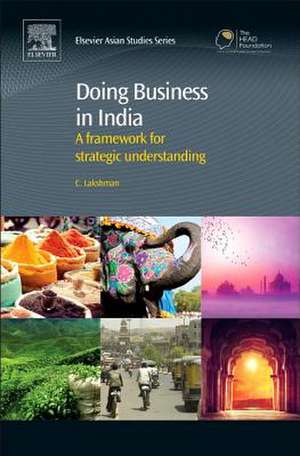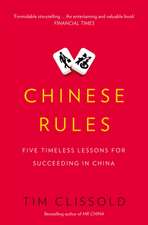Doing Business in India: A Framework for Strategic Understanding: Chandos Asian Studies Series
Autor Chandrashekhar Lakshmanen Limba Engleză Hardback – 25 feb 2015
- Offers a unique and exclusive focus on India
- Focus on political particularities in India crucial for understanding success models
- Explores the overall strategic framework for better strategy formulation in context
- Focus on strategy implementation issues (leadership, HRM, organizational systems)
- Includes cases not found in other sources
Din seria Chandos Asian Studies Series
- 9%
 Preț: 564.21 lei
Preț: 564.21 lei - 23%
 Preț: 499.14 lei
Preț: 499.14 lei - 23%
 Preț: 575.26 lei
Preț: 575.26 lei - 9%
 Preț: 496.56 lei
Preț: 496.56 lei - 9%
 Preț: 576.82 lei
Preț: 576.82 lei - 9%
 Preț: 573.36 lei
Preț: 573.36 lei - 9%
 Preț: 572.93 lei
Preț: 572.93 lei - 9%
 Preț: 647.41 lei
Preț: 647.41 lei - 9%
 Preț: 511.43 lei
Preț: 511.43 lei - 41%
 Preț: 478.75 lei
Preț: 478.75 lei - 9%
 Preț: 482.88 lei
Preț: 482.88 lei - 9%
 Preț: 481.08 lei
Preț: 481.08 lei - 9%
 Preț: 481.08 lei
Preț: 481.08 lei - 9%
 Preț: 544.82 lei
Preț: 544.82 lei - 9%
 Preț: 480.80 lei
Preț: 480.80 lei - 38%
 Preț: 531.06 lei
Preț: 531.06 lei - 23%
 Preț: 611.04 lei
Preț: 611.04 lei - 38%
 Preț: 473.31 lei
Preț: 473.31 lei - 9%
 Preț: 483.04 lei
Preț: 483.04 lei
Preț: 573.79 lei
Preț vechi: 630.55 lei
-9% Nou
Puncte Express: 861
Preț estimativ în valută:
109.80€ • 114.92$ • 91.38£
109.80€ • 114.92$ • 91.38£
Carte tipărită la comandă
Livrare economică 24 martie-07 aprilie
Preluare comenzi: 021 569.72.76
Specificații
ISBN-13: 9781843347743
ISBN-10: 1843347741
Pagini: 224
Dimensiuni: 156 x 234 x 15 mm
Greutate: 0.5 kg
Editura: ELSEVIER SCIENCE
Seria Chandos Asian Studies Series
ISBN-10: 1843347741
Pagini: 224
Dimensiuni: 156 x 234 x 15 mm
Greutate: 0.5 kg
Editura: ELSEVIER SCIENCE
Seria Chandos Asian Studies Series
Cuprins
- List of figures
- List of tables
- Preface
- About the author
- Endorsements
- 1: Why India?
- Abstract
- Doing business in India: a strategic framework
- 2: The institutional context
- Abstract
- Challenges provided by the institutional context: case example
- The role of government in institutions
- Implications for MNCs
- 3: The macroeconomic context
- Abstract
- Path from mixed economy to liberalized capitalism
- Towards a free market economy
- Inflation
- Fiscal deficit in India
- Main sectors of the economy
- The informal economy
- 4: Political particularities in India
- Abstract
- Parliamentary democracy in India
- Federalism in India
- Business implications of federalism
- 5: Profile of consumers and markets in India
- Abstract
- Contrasting consumer values in India
- 6: Strategies adapted to Indian needs
- Abstract
- Industry life cycle and stages
- Case example: Reliance Retail5
- Discussion questions
- Financial highlights
- 7: Rural India and bottom-of-the-pyramid markets
- Abstract
- India’s cultural roots
- BoP markets in rural India
- Special challenges in rural markets
- Case example: ITC and India’s BoP markets
- Conclusion
- Appendix ITC’s triple bottom line achievement
- 8: Competitive advantage of India
- Abstract
- Opportunities for MNCs in this sector
- 9: Leadership of Indian intellectual capital
- Abstract
- Leadership for technological progress in India
- Leadership for the rights of self-determination
- Leadership for total revolution
- Leadership for business and economic development
- Desirable leadership qualities in India
- Knowledge leadership for MNC managers in India
- 10: Organization and control systems for India
- Abstract
- Organizational structure to match India strategy
- Control systems
- 11: Successful HRM for India
- Abstract
- Flexibility for businesses v. problems of contract labor
- Wages, workers’ rights, and union recognition
- Key HRM challenges in India
- Best HRM practices in India
- Compensation and reward systems
- Integrating an Indian JV partner post acquisition
- Cultural knowledge-sharing mechanisms
- References
- Further reading
- Index









